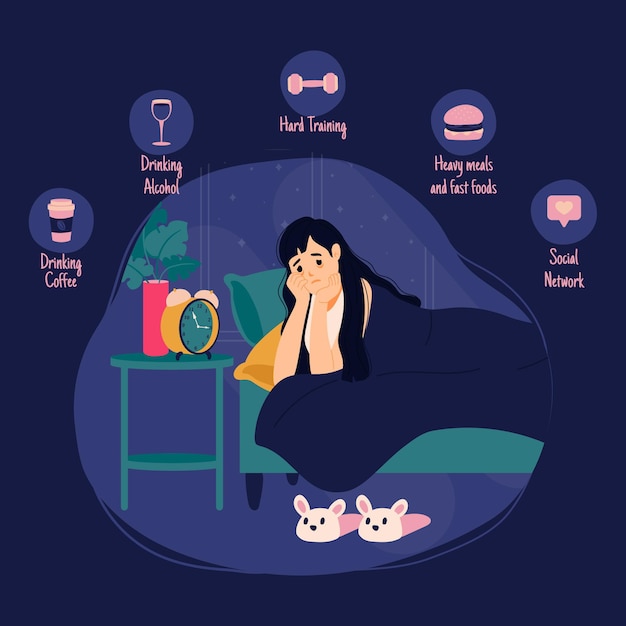
### Anxiety and Sleep
If you’re constantly dealing with anxiety or have anxiety disorders, getting a good night’s sleep can be tough. Relaxing your mind at the end of the day becomes a major challenge.
Anxiety can make it hard to sleep, but understanding its causes and effects can help you manage it better. With careful handling, you can develop healthy sleep patterns.
Even if you don’t have a diagnosed mental health condition, anxiety can still lead to sleep problems. Research shows that anxiety affects not just how long it takes to fall asleep, but also the quality of your sleep. Higher anxiety levels can make you anxious about the time and keep you awake at night. It also causes difficulty in falling asleep and waking up in the middle of the night. This creates a vicious cycle, as people with chronic insomnia often worry about sleeping well.
### Causes of Anxiety While Falling Asleep
Anxiety and insomnia are tightly linked; solving one often helps with the other. The time before you fall asleep is tough because your mind races with the day’s worries. Common stressors include:
– Financial worries
– Relationship problems
– Health issues
– Work-related concerns
### Impact of Anxiety
Nighttime anxiety can lead to:
– Restlessness and tossing and turning
– Inability to relax, keeping you awake
– Panic attacks characterized by sweating, rapid heart rate, fast breathing, and chest pain
– Nightmares that wake you up in fright
– Disrupted sleep cycles with limited REM sleep
– Sensations of falling or twitching as you try to sleep
### Tips for Better Sleep
To ease into sleep, try these techniques to reduce mental and physical stress. Over time, you’ll form habits that help manage your anxiety and improve sleep.
**Engaging Your Mind:** About an hour before bed, turn off everything and do activities that engage your mind, like reading or drawing. Dimming the lights signals your brain that it’s time to sleep.
**Sticking to a Bedtime:** Pick a bedtime and stick to it. This establishes regular sleep-wake cycles and supports your circadian rhythms.
**Maintaining a Journal:** Write down your worries and possible solutions in a journal before bed. This helps you symbolically set aside these thoughts for the night.
**Consciously Relaxing Your Body:** Once in bed, practice systematic desensitization to gradually relax your body, focusing on breathing exercises to oxygenate and calm yourself.
**Using White Noise:** Soft music or mild radio tunes can distract your senses from anxious thoughts.
**Treat the Anxiety:** Therapy, meditation, and medication can greatly improve sleep for those with diagnosed anxiety disorders.
**Doing Yoga and Relaxation Techniques:** Practicing yoga and other relaxation methods can reduce nightly pressure and enhance sleep quality.
**Limit Exposure to Bright Screens:** Avoid laptops or tablets in bed as their blue light delays sleep onset by affecting circadian rhythms.
**Sleep and Alcohol:** Avoid coffee and alcohol before bed. These stimulants lighten sleep and make it less refreshing. Caffeine stays in your system for hours.
**Power Naps:** Limit naps to less than 30 minutes and take them in the early afternoon to avoid impacting nighttime sleep.
**Switch Off Electronic Devices:** Turn off all devices 30 minutes before bed. Light from devices can keep your mind awake. Keep them in another room if possible.
**Quit Cigarettes:** Nicotine is a stimulant that disrupts sleep. If you can’t quit, limit smoking several hours before bed.
**Exercise:** Regular exercise reduces anxiety and improves sleep quality. Exercise earlier in the day or at least 3-4 hours before bedtime.
**Large Meals:** Avoid large dinners close to bedtime. Opt for light snacks like cereal with milk or cheese and crackers to prevent restlessness.
**Aromatherapy:** Scents like peppermint, lavender, and rosemary can soothe your senses, lessen anxiety, and promote better sleep.
### Conclusion
By following these tips, you can counter anxiety and achieve restful sleep. Maintain these habits to ensure a refreshing sleep that heals your body and calms your mind.